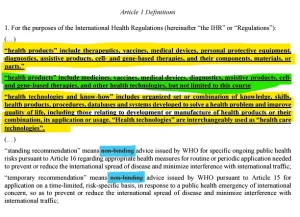Many have asked me for my thoughts on the proposed amendments to the International Health Regulations (IHR) of the World Health Assembly. As the proverb goes, you should be careful what you wish for: I see no earthly way of making this post entertaining, but in what follows I will do my best to assess the worst of these amendments, in the manner of Tacitus – sine ira et studio.
Some background: The WHA first adopted the International Health Regulations in 1969, and they were substantially revised in the wake of the SARS outbreak in 2005. They are binding on 196 member states, including all 194 members of the World Health Organisation. As of 2005, their stated purpose is “to prevent, protect against, control, and provide a public health response to the international spread of disease in ways that are commensurate with and restricted to public health risks and that avoid unnecessary interference with international traffic and trade.” In the wake of the Covid pandemic, member states were invited to propose amendments to this treaty. These individual proposals are collected in a long 200-page document here. All the separate contributions also have been gathered into a much shorter 46-page “article-by-article compilation” here. The amendments have been a particular focus of analysis at the excellent Brownstone Institute. For more background, please see this Unofficial Q&A by David Bell and Thi Thuy Van Dinh, as well as this piece by David Thunder, on Why Governments Must Reject New Amendments to International Health Regulations. Finally, David Bell provides this annotated guide to the most worrying proposed changes. It is extremely comprehensive, and I’ve not been able to find anything of note that he didn’t already unearth.
The shorter 46-page document is what most people will study, not least because it is all in English. Unfortunately, it is powerfully misleading, because it has been stripped of all information about which countries proposed each of the amendments. This lends the impression that it is the World Health Organisation itself that is demanding these changes, but that is not the case. Every last amendment originates with a WHO member state. I have done the brain-breaking work of tracing all the most worrisome proposals back to their origins, and the exercise proved highly illuminating, because it allows me to say with confidence that the bad stuff in this document has four sources:
1) The developing world, particularly India, Bangladesh, African WHO member states, and to a lesser extent Malaysia all want more free stuff from the developed world.
2) The United States are interested in compulsory information sharing about developing pandemic threats. These provisions are clearly directed at China.
3) The European Union and, bizarrely enough, Indonesia, want vaccine passports.
4) The Russian Federation (and curiously, only the Russian Federation) wants more censorship to combat “disinformation.”
If you’re interested in the details, I invite you to subscribe. Your contributions make difficult research posts like this one possible. Otherwise, I advise current subscribers to click through to my website at Substack, because there are too many images in this post for many email providers to swallow.
The Developing World Wants More Free Stuff
Right away, we see the poorer parties to the IHR tinkering with definitions to expand the scope of stuff they’re entitled to. Later on in their amendments, they demand wider access to things like “health products” and “health technologies and know-how,” and so they have to add language to Article 1 (“Definitions”) defining these terms as widely as possible. Bangladesh also hopes to make WHO recommendations binding, by deleting the present specification that mere recommendations are non-binding:
Here and throughout, bolded and underlined text marks proposed additions, strike-throughs, proposed deletions. I have colour-coded the sources. Yellow: Africa group; Green: Malaysia; Blue: Bangladesh
The developing-worlders also want to expand the “scope and purpose” of the International Health Regulations. Specifically, Bangladesh – who are responsible for some the most wretched amendments – want to apply the Regulations not merely to “public health risk” but to “all risks with a potential to impact public health,” naturally because this increases their opportunity to lay claim to intellectual property and pharmaceutical products that they can’t develop themselves. The Africa Group, meanwhile, want to shift the emphasis from “avoid[ing] unnecessary interference with international traffic and trade,” which they have precious little of, to “livelihoods, humans rights, and equitable access to health products and health care technologies and know-how.” Again, more free stuff.
The post How Bad Are the Covid-Inspired Amendments to the International Health Regulations of the World Health Assembly? appeared first on LewRockwell.

0 comments on “How Bad Are the Covid-Inspired Amendments to the International Health Regulations of the World Health Assembly?” Add yours →